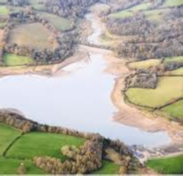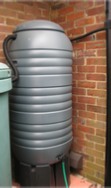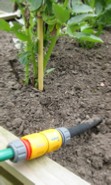

Web design © Graeme de Lande Long. Terms & Conditions.



Community Website
Scaynes Hill Village



Where does all the water go?
Many of us probably give little thought to that readily available commodity, water, which always seems to be there when we turn on the tap. With the formal declaration of a drought in large parts of southern and eastern England and the imposition of water restrictions across the region affecting over 20 million people it is perhaps timely to consider where we in Scaynes Hill get our water from and what happens to it after we have used it.

Starting on 6th April temporary water restrictions are being introduced in our supply area to combat the effects of the increasingly severe drought following two abnomally dry winters. The use of hosepipes for watering gardens, washing cars, filling ponds, cleaning patios and boats and the filling of swimming and paddling pools and fountains is not permitted. Hosepipes can discharge a large amount of water in a short time compared to the use of buckets or watering cans, which are still allowed. Also any outdoor use is not returned promptly to the river via sewers and treatment works. Instead it is generally directed to soakaways or it will evaporate either directly or by evapo-transpiration from plants. It is therefore this outdoor non-essential use that the water companies are restricting, since in times of drought hosepipes for garden watering may account for up to 70% of our usage.
When we flush our wastewater down the drain it is taken by sewer to the Southern Water sewage treatment plant discretely located about a mile away next to the river at the bottom of Sloop Lane. After removal of solids the remainder of the contaminants are largely eliminated by a biological process and the water is discharged to be diluted in the River Ouse. Since the river flows back to Barcombe Mills a small part of it will effectively be re-cycled. In dry periods when river flows are naturally lower, South East Water release water stored in the much larger Ardingly Reservoir into the river to augment flows so that there is enough to extract what is needed at Barcombe, while leaving sufficient in the river to support the needs of fish and other aquatic life. Normally at this time of year Ardingly reservoir would be full of water. However, it is currently less than half full.

Some degree of protection against the restrictions on outdoor use can be achieved by installing water butts to catch rainfall from the roof and irrigating the garden using a soaker hose (a hose with many tiny holes in it so water drips onto the soil very slowly). This uses water that otherwise goes to waste and minimises evaporation loss. However, to be effective for any length of time such systems need to be installed in time to catch the winter rainfall and have a large storage capacity. Such a drip irrigation system, as it is known, can be run off a mains supply and provided it has a pressure reducing valve and timer installed is considered exempt from the current water restrictions. If all this is a bit high tech then the good old watering can, used in the evening to reduce evaporation losses, is still a good standby.

Notwithstanding the above water is a precious commodity that we should not waste. Even if much of it is recycled the amount of energy, chemicals and labour that goes into purifying it to some of the highest standards in the world means that each person's daily use of about 160 litres/day puts over a third of a tonne of CO2 into the atmosphere every year. If we can save a bit of this it all helps. Ways to save water in the home include:-
- Showering rather than taking a bath, or taking shorter showers, is likely to be the most effective way of saving water. The average bath uses about 80 litres while a shower of 8 minutes uses about 62 litres on average; some power showers use up to 136 litres in the same time. Taking 4 minutes in a water efficient shower (not a power shower) could save nearly 50 litres over a bath or nearly a third of our daily consumption. Even a 4 minute power shower would save 10% or 8 litres compared to a bath.
- Install an aeration device or water efficient shower head, particularly if you have a power shower. As this also saves hot water the energy saving alone could pay for itself in less than a year.
- Installing Save-a-Flush bag in each toilet cistern, reduces the volume of each flush by 1 litre. About 15% of our water usage is due to flushing and a device like this can save about 10% of that. Toilets installed after 2001 will have a reduced sized cistern and do not need this.
- Turn off the tap while cleaning your teeth. A running tap wastes over 6 litres/min. If the entire population of England and Wales remembered to do this it would save enough water to supply another 500,000 homes.
- Fix dripping taps and leaks (it’s surprising how much water is lost this way!).
- Use dishwashers and washing machines only when they are full.
- Save the cold water that comes through before a tap runs hot, and use it to water plants.
- Wash fruit and vegetables in a washing-up bowl of water instead of running under a tap.
There are other ways to save water. Details of these and other information about the water restrictions can be found on the South East Water website https://southeastwater.co.uk

05 April Posted by Graeme de Lande Long
Our tap water is provided by South East Water, who extract water from the River Ouse at Barcombe Mills and put it into Barcombe Reservoir lying next to the river in a location popular with walkers, bird watchers and fishermen alike. Water drawn from the reservoir is purified and sterilised in the adjacent water treatment works and then pumped again through a 10 mile long pipeline to a covered treated water reservoir at Horsted Keynes. The elevation of this reservoir is about 100 m higher than Barcombe and so the pumping requires a lot of energy. From there it is piped downhill to Scaynes Hill.
<< Back to News